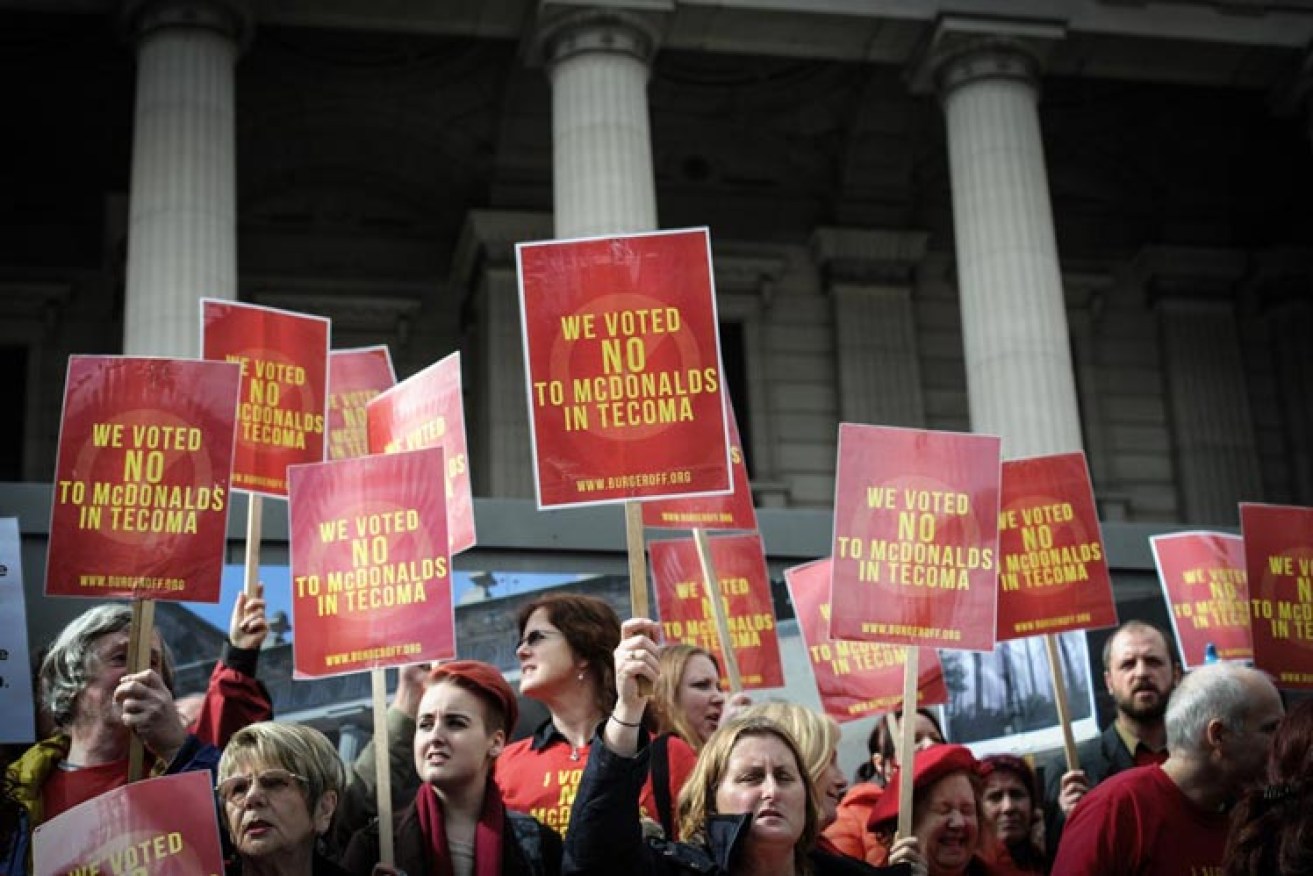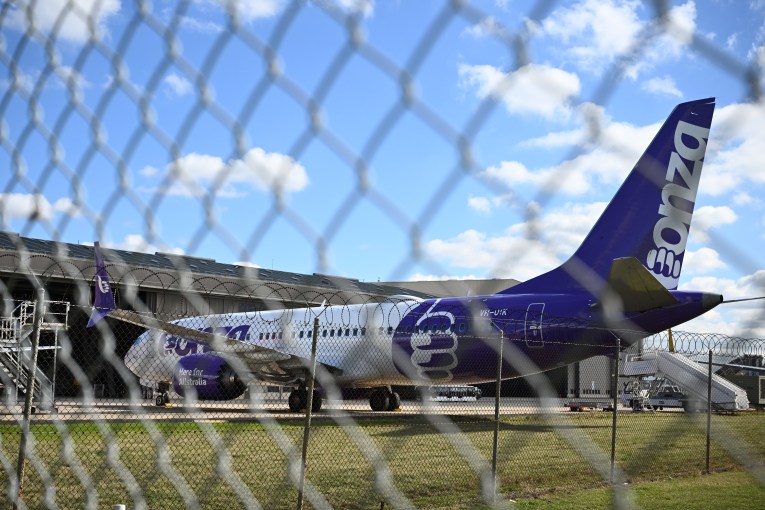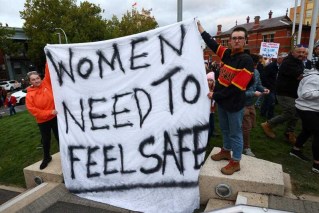Bunfight: Why small towns are saying no to Maccas

AAP
The smell of Big Macs will soon waft through the Dandenong Ranges National Park and some of the local residents are furious.
After two decades of rejecting large scale fast-food developments, people in the tight-knit community of Tecoma, about 45 minutes from Melbourne’s CBD, are watching a McDonald’s outlet rise from a patch of earth on which a dairy and an alternative-lifestyle centre called Hippie Haven once stood. During the protests over the development, 600 unhappy locals even turned the land into a permaculture garden. They tried everything from flashmobs to sit-ins before finally taking their objections to McDonald’s HQ in Chicago, but their efforts were to no avail.
When it’s finished, the 24-hour diner will join a network of 900 McDonald’s restaurants in Australia and 34,000 worldwide. And while McDonald’s won the day, the Tecoma Maccas has been a bunfight, like many other fast-food developments in small communities.
In 2011 the local council voted against the project following strident opposition from locals, but McDonald’s had the decision overturned at the Victorian Civil and Administrative Tribunal (VCAT). After two years of wrangling, on August 8, 2013, the courts finally cleared the remaining hurdles for the builders. Finally the bulldozers rolled in.
Not in our backyard
While the legal fight over the Tecoma outlet continues, it is just one of dozens of grass-roots protests across Australia against fast-food chains moving into small towns.
Opponents say the outlets create traffic, parking and noise problems. Their littler is found in everyone’s front yard. There’s a pervasive smell. Hoons gather there. They hurt local businesses. They upset the character of the place.
Proponents argue the opposition is reflex NIMBYism and say you can’t stop progress. The outlets bring jobs and other businesses to town, and besides, some of the locals like the food.
One Tecoma trader, who didn’t want her name published for fear of persecution, told the The New Daily the protestors had kept people from the small shopping strip, hurting sales at some of the local shops.
“The lady in the shop next door was getting abused for having a difference of opinion and I had to go in and remove the protester from the store. They wave signs in front of windscreens. They abuse security guards,” she said. Her view was the new McDonald’s would be good for local commerce.

Tecoma protestors took their grievance all the way to Victoria’s state parliament. Photo: AAP
Not alone
But for Tecoma’s Burger Off! campaign spokesperson Garry Muratore, the development was an insult to the place he called home, and he knew his group was in for a fight. McDonald’s has taken local councils to courts or tribunals more than 40 times in the past five years.
“The majority of times they do this, they win,” he said. “Most of the time it’s because councils can’t afford the legal bills, which will be hundreds of thousands of dollars.
“In Tecoma, we had the right to appeal VCAT, but the council said no because it was going to cost up to $1.4 million with no guarantee of winning.”
In NSW, McDonalds has just won a court appeal against the Orange City Council over its decision to reject a proposal to build a second restaurant in the city.
Tasmanian resident Simon Rolffe led the charge against Macca’s opening in a heritage precinct in New Norfolk, near Hobart, next to one of the state’s oldest buildings, Willow Court. However, he backed off when legal threats began rolling in.
“The threat of litigation was a worry,” he said, adding that the developers threatened to sue if it delayed their opening time.
Mr Rolffe said the council hoped it would increase employment in the small town, but he felt, for the health of the valley, it wasn’t a suitable proposal.
“Now the rubbish and hooning has increased. I live 400 metres from it and the litter blows in. They clean up their car park, but the drive-away mentality is that people throw it out their window.”
On rare occasions, however, local communities have won the fight.
Decades-long battle
Last April, Byron Bay stopped KFC due to parking shortages. It also stopped Macca’s in the 1990s. Byron Mayor Simon Richardson said the surf-haven faces constant battles against developers.
“We get 1.5 million visitors a year. We’ve had 20 years of companies wanting to come in and exploit that, not add to it.”
He says that state and federal governments need to reform planning laws in order to empower local councils.
“Byron’s records of defending decisions before the Land and Environment Court is bleak. It can only operate within the legislation. The power to respect local communities is eroded. Globalised companies can come in and ride rough-shod over communities.”
Port Macquarie paediatrician Dr David McDonald helped stop Macca’s opening its fourth outlet in town.
It was rejected by the Lands and Environment Court because it was earmarked for a residential zone next to a school, which did not comply with planning.
He argues that fast-food developers take advantage of loopholes in local planning regulations. He wants a national standard on fast-food exclusion zones around schools.
The view from head office
However, McDonald’s Australia rejects the paediatrician’s claims.
“We do not target sites near schools. In many areas they’re in the same vicinity because a school and a restaurant are in the same zone,” said a spokesperson.
“The things we consider for new restaurant locations include the availability of sites, suitable zoning, access to major thoroughfares, population growth and local demand.”
The spokesperson said McDonalds worked “extremely hard to address community concern” and, in Tecoma, had adhered to more than 70 conditions followed the VCAT ruling.
And it appears there are more than a few local residents in favour of the development. The ‘Yes to Tecoma McDonald’s’ Facebook has 3800 likes (not always an accurate measure of support, of course), but it also carries posts criticising the protestors for hitting police and disrupting local traffic.
Nor is the anti-McDonald’s fight unique to Australia. Mr Muratore said the Tecoma campaign was contacted by international communities like Ohio in the US and Monmouth in the UK, which are also opposing the drive for local drive-thru fast-food outlet.
Mr Muratore said communities were frightened McDonald’s will build anywhere it can. “If they could get in at ANZAC cove, they would.”
Despite the certainty that Tecoma will be home to a McDonalds, protests continue at the site.
Michelle Slater is a Melbourne-based freelance writer.








